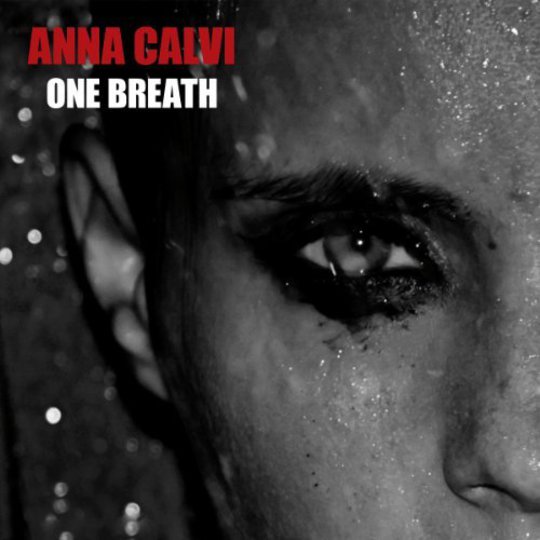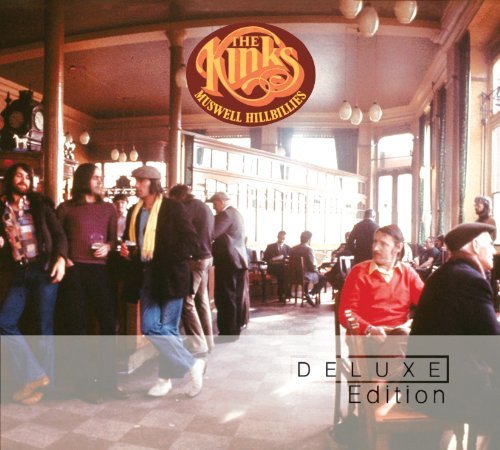Ahead of this year's Mercury prize, DiS in partnership with Naim Audio's new wireless music system, mu-so, will help you GoDeeper into 2014's nominated albums. Today, we would like to turn your attention to the blues-rock hurricane that is two times nominee Anna Calvi. This review originally appeared on DiS last October when the album was released. Visit our Mercury mini-site for our collection of her best covers, plus more coverage of all of this year's nominees.
For an artist whose grandiose music and passionate style have so often been described as breathtaking, the idea of focusing on what happens when you take a deep breath and prepare for the unknown sounds promising.
Having to cope with the expectations surrounding her second album following the international praise for her monumental, Mercury Prize nominated debut, South Londoner Anna Calvi surely knows a thing or two about that moment of regeneration when you decide to carry on and accept the fate.
Vigorous vocals, virtuoso guitar solos and tense orchestral climaxes were the main ingredients that made her enthralling musical and performative style synonymous with passion and deep, noir-ish atmospheres. Winning the heart of Brian Eno and Nick Cave amongst many, her powerful vocals and enchanting stage presence made for a pretty unique and identifiable style: whether she was covering Edith Piaf or Beyoncé, Anna Calvi thundered with pathos.
While endlessly enjoyable for her admirers, this abundance of vigour felt, at times, just a little too much for the fans of the understated. As a whole, One Breath sounds like a negotiation between that studied predisposition for intensity and a series of unexplored nuances - a challenge for the artist and a much more dynamic deal.
Rather than a hyper-cohesive record like Anna Calvi, One Breath is a compilation of gut feelings. It is perhaps not a coincidence that the album, produced by John Congleton, had a much shorter gestation. Opener 'Suddenly' works to acclimatize fans with a quintessential taste of the Anna Calvi treatment. It starts with a bashful guitar and distant choirs only to accumulate tension and burst with a cascade of booming vocals and mounting percussions. The galloping single 'Eliza' merges the sinuous vocals of its chorus with a regular, resolute drum beat, perhaps dredging up the persistent invocations of her old highlight 'Desire'.
The first, astonishing surprise is the agitated electro-pop of 'Piece by Piece', a song that Calvi herself has indicated she regards as one of her best new experiments. Emerging from the sharp-edged noise of plucked strings, Calvi's voice sounds sweet, relaxed and anxious, moving across a repetitive drum machine pattern and surpassing various unexpected electric creases. In her effort to express the sense of memory loss and fragmentation, Calvi puts her powerhouse character aside for a while to research a new, striking theatricality. More than the hard rock manners of 'Tristan' (which will sure cause the PJ Harvey comparisons to continue for a while) or the catchy chorus of 'Carry Me Over', it's the sparse mood of 'Bleed Into Me', with its slow-paced strums and its deeply melancholic choirs, which leaves the most enduring mark. So does the smoky, cinematic atmosphere of 'Sing to Me', a tribute to Maria Callas and the evocative power of the human voice. Calvi manages to create a sound that is perhaps even thicker and heavier than in the past, but there seems to be more space for the listener to find his or her way in, and less the risk of being instantly overwhelmed.
Things get a little messier on 'Love of My Life', which relies on distortion and reverb to camouflage the poppiest idea on the record; despite its intention to be trenchant, it sounds quite bland compared to the rest. Again, it is when aggression and anxiety are less explicit and much more disentangled that Calvi shows her best new profile, as the title-track compellingly shows. “I've got one, one second to live before I say what I've got to say,” Calvi murmurs over a monotonous keyboard and a sparse guitar, giving away that “it's gonna change everything”. And indeed, a few seconds before the exact half of the song, a drum crescendo gradually takes the scene. But instead of the usual, epic explosions you would expect to follow, an airy, sublime string orchestration releases the accumulated tension.
One Breath benefits from its variety and from a taste for experimentation which, striking subtle chords that invite the listener to stay and revisit.
-
7Giuseppe Zevolli's Score






















